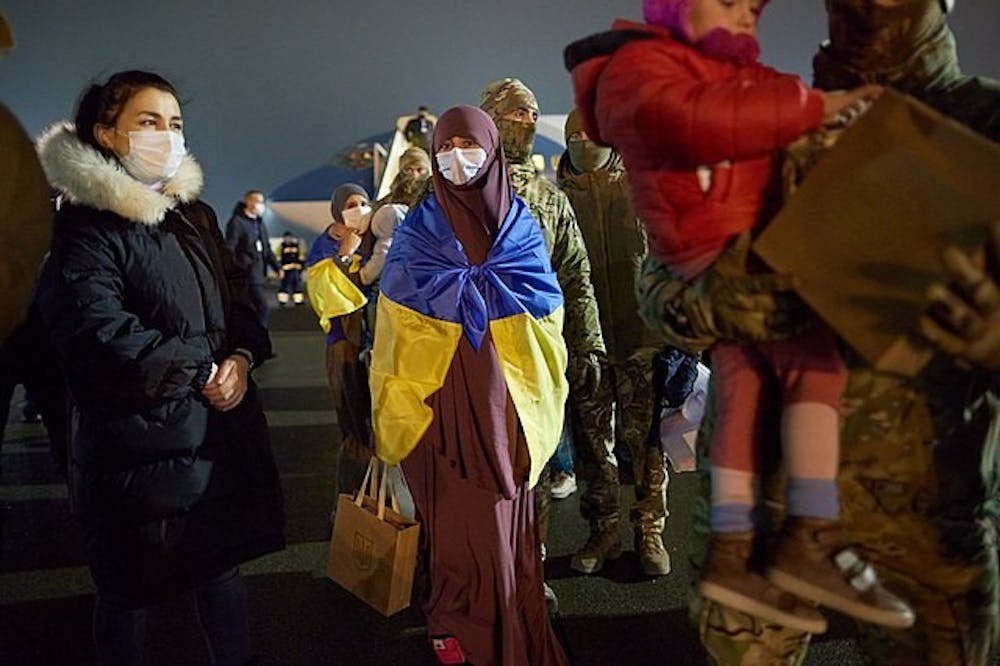If there is anything that media coverage has taught us, it is that everything is biased in some way, shape or form. Much of this bias is institutionalized — events and people are portrayed negatively in the media to maintain systems of power. Nothing exemplifies this more than the coverage and response globally to the Ukraine-Russia conflict. In late February, Russia invaded Ukraine, bombing residential areas and civilian infrastructure — these violent attacks continue to terrorize the country. The conflict in Ukraine is a terrible example of too much power being placed into the wrong hands, but what is even more evident are the racial undertones of the conflict.
In the face of conflict, Ukraine — a European country with a predominantly Western culture — has received sympathy from almost every economically influential country, including our own. Meanwhile, other countries involved in violent conflicts over the past few years that differ from predominantly European culture are often cast aside by other countries and occasionally actively sabotaged. This is not a competition for oppression — this is not to imply that as a Western country, Ukraine deserves any of this unjust violence. Rather, it is an acknowledgment that sympathy, which all people are worthy of receiving, has still managed to be corrupted by white supremacy.
Much like the criminalization and overt lack of sympathy associated with American institutions when people of color are involved, the same is true overseas. From the conflicts in the Middle East to Africa to Central America, people of color have received significantly less effective resources from Western countries, even when their ideologies have coincided with those of the U.S. This trend contrasts sharply with the Ukraine-Russia conflict. Here we have two European nations — one violently trying to overtake the other, which is abhorrent and painful to watch. CNN has described Ukraine’s suffering as “harrowing accounts of tragedy.” Ukraine is receiving sympathy from all over — and justifiably so.
Additionally, there is an underlying implication in the way that refugee operations and coverage of the conflict are being handled. Refugees of color such as African, Asian and Caribbean citizens were met with violence by border security while trying to escape the Russian invasion, and African students were met with extortion — having to pay to make it through the procedures. Some argue that the differences that certain refugees face are based on culture. Due to the long withstanding history of terrorism and the historical ties between Ukraine and Poland, some people are viewed as threats while others are prioritized by aiding countries. Even still, these actions are alarming as it proves that mistreatment based on skin color, ethnicity and nationality persists globally, and it always follows the same pattern — as one Ghanaian student lamented, “white people first.”
Ukraine is being covered by national media outlets through racist narratives. Many find ways to justify failing to help, acknowledge or sympathize with countries of color — believing that non-Western cultures, and therefore, people of color tend to be violent and uncivilized. The Bulgarian Prime Minister Kiril Petkov admitted, “These people are Europeans,” as if that made all the difference. Most people would flee from an invasion of their country, but as he put it,“This is not the refugee wave we have been used to … people with unclear pasts, who could have been even terrorists.” Despite white countries having a history of terrorism themselves, white Ukrainian refugees are prioritized because they are thought to be trustworthy and need help. This description should be open to all refugees fleeing the country — they all need help.
Even more so, this is a self-fulfilling prophecy — the history of colonization and exploitation from Western powers has left non-Western countries with significantly less wealth. Their poverty is then used as a justification for not intervening or helping these countries down the line. Understandably, there are nations that do not want the help of Western countries because of this history. Those who do, however, are still ignored until it is beneficial to the U.S. or their allies. The idea that non-western countries are too violent and threatening to deserve sympathy is a hypocritical one. Western history is riddled with pointless wars, extreme laws and restricting rulers — but it is only thought to be uncivilized when people of color engage.
Finally, while other Western countries feel intimidated by the possibility of another like-minded and predominantly white country being taken over, the same cannot be said for countries of color. If Putin were to succeed in invading Ukraine and annexing it, it would mean that an authoritarian ruler is able to take over a country much more aligned with our own values. This potential annexation would directly threaten other European countries' sense of safety — not only in their sense borders but in their cultures and ideologies. There is a disturbing trend — countries of color that tried to become self-reliant are met with resistance or overt sabotage while white countries sympathize with one another and issue support to stand together.
Essentially, there is a color line to the way we view conflicts. Someone is always going to be highly prioritized — even more so, preferred — when it comes to supporting and likewise when it comes to exploiting. Hopefully, peace will reach Ukraine, but I equally hope that it will reach other conflicts that have dragged out over the years and devastated millions. The point is not a comparison, but compassion — compassion for universal human rights, equal treatment and free will.
Shaleah Tolliver is the Senior Associate Opinion Editor for The Cavalier Daily. She can be reached at opinion@cavalierdaily.com.
The opinions expressed in this column are not necessarily those of The Cavalier Daily. Columns represent the views of the authors alone.







